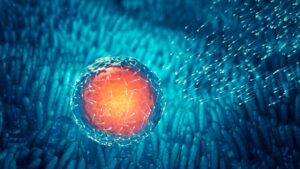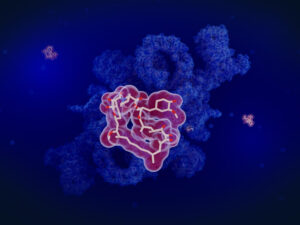More NMN clinical trials that examine NMN’s impact on more particular age-related diseases like high blood pressure, metabolic problems, and skin aging are just getting started or are already ongoing. According to previous studies done on animals, nicotinamide mononucleotide (NMN) raises nicotinamide adenine dinucleotide (NAD) levels thus extending a healthy lifespan with minimal risks. Furthermore, certain clinical trials have shown that NMN enhances muscular function, endurance, and cardiovascular health. Results from clinical trials of animals to humans of such discoveries have been conflicting. A new trial has been conducted to better understand the correlation between NMN and its impact on human and their lifespan.
The main findings
The study shows that NMN not only elevates NAD+ blood levels but also increases walking distance if taking the optimal dose daily. The first human clinical trial found that NMN supplementation was safe up to 500 mg/day and significantly increased plasma concentrations of NAD metabolites, even if changes in plasma NAD concentration were not addressed. Following another investigation, the results showed that oral supplementation with 300 mg/day of NMN was safe and dramatically improved various blood biomarkers, including HbA1c and HDL. Still, they considerably decreased blood NAD levels in postmenopausal female participants.
Therefore, according to these and lots of other findings, further clinical investigations are required to assess the effects of NMN supplementation on aging, healthspan, and the impact on healthy middle-aged humans, including both males and females.
The most important information was obtained from the participants, such as name, age, race, height, medical history, physical factors such as blood pressure, blood rate, body temperature, ECG, and more parameters. The volunteers were not supposed to take any drugs that contain any kind of niacin from 2 weeks before the investigation, as well as other medicines.
Blood samples were taken from each participant on days 0, 30, and 60. At baseline and day 60, clinical lab tests on blood and urine samples were performed. On days 0, 30, and 60, the 6-minute walking test was performed too, where volunteers were required to walk so the distance could be measured. Only three assessments were conducted: once at baseline, once after the first month, and once after the second month. Participants were not required to engage in any regular physical activity throughout the investigation.
The results
This is a randomized, placebo-controlled, double-blinded study, where 80 healthy middle-aged participants were given 300 mg, 600 mg, and 900 mg daily doses of oral NMN supplementation. The first and most important factor for this study to be conducted is the effect of NMN on NAD+ blood concentrations. In addition, safety, clinical efficacy, and tolerability were tested too.
At days 30 and 60, blood NAD concentrations were shown to have significantly increased from baseline in all NMN-treated groups. No significant changes were seen in the placebo groups at the same periods.
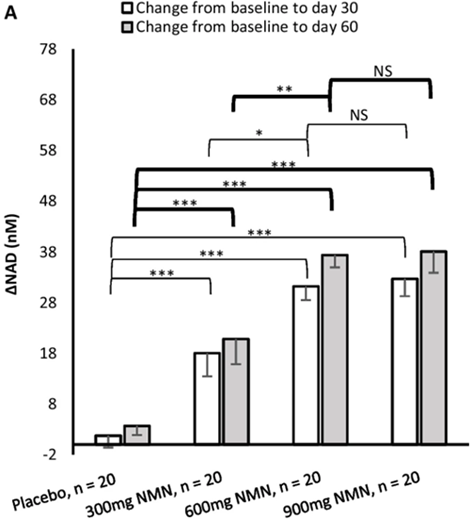
Yi, L., Maier, A.B., Tao, R. et al. The efficacy and safety of β-nicotinamide mononucleotide (NMN) supplementation in healthy middle-aged adults: a randomized, multicenter, double-blind, placebo-controlled, parallel-group, dose-dependent clinical trial. GeroScience (2022). https://doi.org/10.1007/s11357-022-00705-1
(The difference of NAD+ blood concentrations compared to placebo groups.)
Significant changes in the blood NAD concentrations were found in the 300 mg and 600 mg groups. On the other hand, no differences were obtained between the 600 mg and 900 mg groups.
None of the individuals’ clinical lab test results showed any concerns. All NMN doses were well tolerated. In addition, only nine side effects were observed in 7 participants in the 900 mg NMN-treated group. However, no adverse effects were seen in the 300 mg or 600 mg groups. The negative effects were not linked with the NMN treatment.
Six-minute walking test
While the 300 mg NMN group demonstrated an increase at day 60 participants in the 600 mg and 900 mg NMN-treated groups walked a significantly greater distance at both the 30-day and 60-day compared to baseline. The six-minute walking test walking distances were noticeably longer compared to the placebo in all three NMN-treated groups.
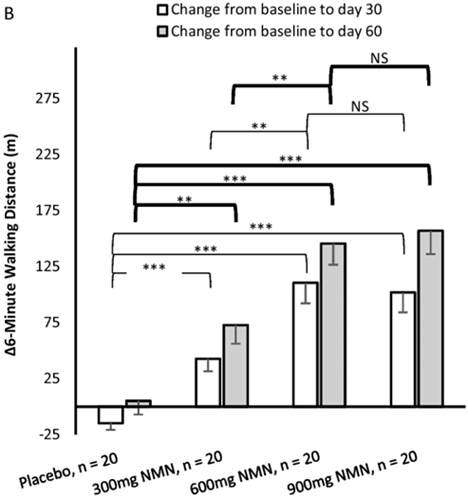
Yi, L., Maier, A.B., Tao, R. et al. The efficacy and safety of β-nicotinamide mononucleotide (NMN) supplementation in healthy middle-aged adults: a randomized, multicenter, double-blind, placebo-controlled, parallel-group, dose-dependent clinical trial. GeroScience (2022). https://doi.org/10.1007/s11357-022-00705-1
(Over six minutes of walking, NMN improves walking distances, indicating increased physical strength.)
Additionally, a 36-question questionnaire on health and quality of life was given to the participants (SF-36). The scores mostly demonstrated the same pattern as NAD+ levels and walking distance. There was a slight improvement in the 300 mg/day group compared to the placebo, and a significantly more dramatic improvement in both the 600 mg/day and 900 mg/day groups. However, between these two groups, no changes were seen.
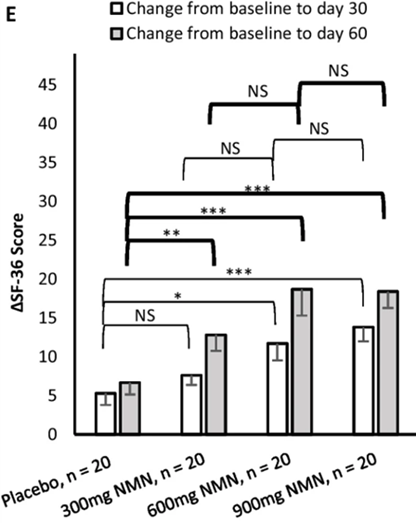
Yi, L., Maier, A.B., Tao, R. et al. The efficacy and safety of β-nicotinamide mononucleotide (NMN) supplementation in healthy middle-aged adults: a randomized, multicenter, double-blind, placebo-controlled, parallel-group, dose-dependent clinical trial. GeroScience (2022). https://doi.org/10.1007/s11357-022-00705-1
(NMN improves endurance as well as health and general well-being.)
Limitations of the study
Given that there were only 20 participants in each group more participants and longer testing times would increase the significance of these findings. Additionally, other parameters such as muscle endurance and more would demonstrate whether NMN actually enhances strength.
Final thoughts
This study showed positive effects on different NMN doses, including 300 mg, 600 mg, and 900 mg in healthy people aged 40 to 65. It demonstrated that NMN supplementation at oral doses of up to 900 mg per day is secure and well tolerated. The 60-day NMN treatments did not result in any noticeable unusual changes in laboratory data or a physical assessment. The study’s findings indicate that NMN boosts blood NAD+ levels and enhances bodily function. NMN supplementation improved the blood biological age, the six-minute walking test, and SF-36 scores significantly in healthy adults, indicating a beneficial effect on physical strength and general health conditions.


